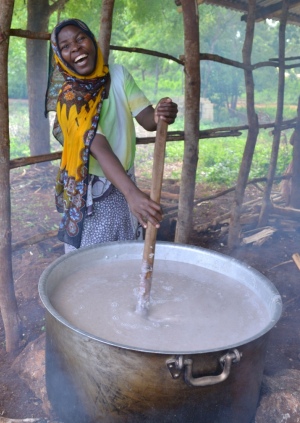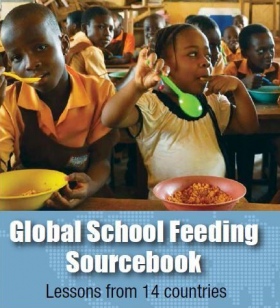Strong school meals programmes help children to learn and communities to prosper
by Kate Wighton

Home Grown School Feeding initiative launches in Zanzibar, credit Charlotte Broyd
Analysis shows well-designed school feeding programmes have multiple benefits.
Effective school meals programmes boost primary school enrolment and attendance, raising educational achievement levels. They also improve nutrition and often bring economic benefits to communities, according to a new analysis.
‘The Global School Feeding Sourcebook: Lessons from 14 Countries’ looks at how school feeding programmes work in a series of countries spanning Africa, India and South and Central America.
It is published by Imperial's Partnership for Child Development in collaboration with the World Food Programme and the World Bank. PCD works to raise educational achievement through support for better school health nutrition in low and middle income countries.
The analysis aims to provide findings and data, which will give countries worldwide the knowledge and evidence to boost their national school feeding efforts.
The report found that higher levels of participation in school, and children’s enhanced ability to learn, stand out as the primary benefits of school feeding.
But the researchers also found increasing recognition worldwide of both immediate and long-term benefits for health and nutrition. In Ghana, for example, school food is fortified to combat nutrient deficiency, and in Chile children are educated to avoid obesity through healthier eating.

School meal programmes also create jobs for cooks and caterers, credit Francis Peel
The report highlights the economic benefits of school meals programmes that flow from the jobs they provide to cooks and caterers. School meal programmes can also increase income and training for smallholder farmers who can benefit from guaranteed markets for their crops.
Imperial’s PCD works with governments in low and middle income countries to develop Home Grown School Feeding (HGSF) programmes, which aim to deliver cost-effective national school feeding programmes using food that is locally grown by smallholder farmers.
PCD staff use their research expertise and experience in the area of school nutrition to help governments convert this research into effective HGSF programmes and policies. A recently-released film showcased the impact that effective HGSF programmes can have on school children and communities in Mali and Kenya.
It tells the story of Teresiah in Naivasha, central Kenya. She is bringing up her four children alone after their father died two years ago.
As a smallholder farmer, she sells her crops to the local North Karati primary school, which her children also attend.
Teresiah received training in better farming practices. She said: “I have learned how to till the soil, how I should divide the farm, how to separate the crops, how to separate the beans from the maize. I will not wander around looking for kales to buy in the market, now I go to the farm and pluck some and cook for my children, and they sleep well.”
Teresiah’s life has been changed in more than one way by the local school feeding programme: she is also employed as the cook at the school.
“This job is good, and I have benefited. I am not worried from where to get money or to find the next meal,” she said.
As a result, Teresiah’s children can attend school instead of helping their mother on the farm.
The researchers say that such community participation is key. Their analysis shows that the strongest and most sustainable programmes are those which respond to a community need, are locally owned, and incorporate some form of parental or community involvement.
School feeding programmes exist in almost every country in the world for which there is data, representing a total annual global investment of US$75 billion. This provides about one in five children worldwide with a meal at school every day.
 However, the report shows that too often school feeding programmes are weakest in countries with the greatest need. The sourcebook responds to demands from governments in the poorer countries for guidance on how to improve their national school feeding programmes.
However, the report shows that too often school feeding programmes are weakest in countries with the greatest need. The sourcebook responds to demands from governments in the poorer countries for guidance on how to improve their national school feeding programmes.
Various countries have seen health and education benefits from effective school meals programmes, but successful design and implementation differs widely from country to country, the report finds.
“The overall message from this research is that there is no ‘one size fits all’ for school feeding and there are many routes to success. Context is key,” said Dr Lesley Drake, executive director of Imperial’s PCD and lead editor of the report.
“The sourcebook will act as a valuable tool for governments to enable them to make evidence-based decisions that will improve the effectiveness of their school feeding programmes.
Article text (excluding photos or graphics) © Imperial College London.
Photos and graphics subject to third party copyright used with permission or © Imperial College London.
Reporter
Kate Wighton
Communications Division